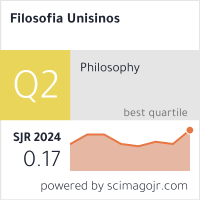World and alienation in Hannah Arendt’s
DOI:
https://doi.org/10.4013/5362Resumen
This study presents an interpretation of Hannah Arendt’s reflection on man as a “being of the world” as well as the most general worldly conditions of human existence. By examining the untold totalitarian deworldlization, it aims at analyzing the extent to which Arendt critically reconsidered the pre-modern and modern “alienation”, distinctly expressed both in the conceptual scenario of the traditional political philosophy and in the history of hierarchical assortment of man’s most active and basic engagements (labor, work and action) and nonactive engagements (thinking) in the world. Alienation literally means a denial of the cosmos (mundus, in Latin), a degradation of everything which connects the human existence to the human world, or yet, a lack of balance in the full foundation and preservation of the world, and above all, of “the public side of the world”. The totalitarian regimes broke the line of Occidental History, pointing out the coming of a dim era in relation to the traditional philosophic legacy and brightening up the “trances of our times” still so much current in modern societies’ passage to the 21st century.
Keywords: Hannah Arendt, totalitarianism, action, thinking, science, technology, philosophy politics.Descargas
Métricas
Descargas
Publicado
Cómo citar
Número
Sección
Licencia
Concedo a revista Filosofia Unisinos – Unisinos Journal of Philosophy o direito de primeira publicação da versão revisada do meu artigo, licenciado sob a Licença Creative Commons Attribution 4.0 (que permite o compartilhamento do trabalho com reconhecimento da autoria e publicação inicial nesta revista).
Afirmo ainda que meu artigo não está sendo submetido a outra publicação e não foi publicado na íntegra em outro periódico e assumo total responsabilidade por sua originalidade, podendo incidir sobre mim eventuais encargos decorrentes de reivindicação, por parte de terceiros, em relação à autoria do mesmo.










